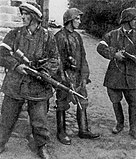| Revision as of 16:31, 1 June 2006 view source216.21.34.174 (talk)No edit summary← Previous edit | Revision as of 02:51, 2 June 2006 view source Alkivar (talk | contribs)Extended confirmed users14,533 edits new box fucks up display... put below infobox insteadNext edit → | ||
| Line 1: | Line 1: | ||
| <!--SCROLL DOWN IN ORDER TO EDIT THE ARTICLE--> | <!--SCROLL DOWN IN ORDER TO EDIT THE ARTICLE--> | ||
| ⚫ | {{Polish Secret State small}} | ||
| {{Infobox_Polish soldier | {{Infobox_Polish soldier | ||
| | name=Tadeusz Komorowski | | name=Tadeusz Komorowski | ||
| Line 20: | Line 18: | ||
| | medals=] ] ] ] ] ] ] ] ] ] | | medals=] ] ] ] ] ] ] ] ] ] | ||
| |}} | |}} | ||
| ⚫ | {{Polish Secret State small}} | ||
| General Count '''Tadeusz Komorowski''' (], ] - ], ]), better known by the name '''Bór-Komorowski''' (after one of his wartime code-names: ''Bór'') was a ] military leader. | General Count '''Tadeusz Komorowski''' (], ] - ], ]), better known by the name '''Bór-Komorowski''' (after one of his wartime code-names: ''Bór'') was a ] military leader. | ||
Revision as of 02:51, 2 June 2006
Template:Infobox Polish soldier
| Part of a series on the |
| Polish Underground State |
|---|
 History of Poland 1939–1945 History of Poland 1939–1945 |
| Authorities |
|
Political organizations Major parties Minor parties Opposition |
|
Military organizations Home Army (AK) Mostly integrated with Armed Resistance and Home Army Partially integrated with Armed Resistance and Home Army
Non-integrated but recognizing authority of Armed Resistance and Home Army Opposition |
| Related topics |
General Count Tadeusz Komorowski (June 1, 1895 - August 24, 1966), better known by the name Bór-Komorowski (after one of his wartime code-names: Bór) was a Polish military leader.
Komorowski was born in Lwów, Austria-Hungary (now L'viv, Ukraine). In the First World War he served as an officer in the Austro-Hungarian Army, and after the war became an officer in the Polish Army, rising to command the Grudziadz Cavalry School.
After taking part in the fighting against the German invaders of Poland at the beginning of World War II in 1939, Komorowski functioned as one of the organisers of the Polish underground in the Kraków area, with the code-name Bór. In July 1941 he became deputy commander of the Home Army (Armia Krajowa or AK), and in March 1943 gained appointment as its commander, with the rank of Brigadier-General.
In mid 1944, as Soviet forces advanced into central Poland, the Polish government-in-exile in London instructed Bór-Komorowski to prepare for an armed uprising in Warsaw. The government-in-exile wished to return to a capital city liberated by Poles and not by the Soviets, and to prevent the Communist take-over of Poland which Stalin had clearly set in train.
The Warsaw Rising began on 1 August 1944, and the insurgents of the AK seized control of most of central Warsaw. Elements of the Soviet Army stood only 20 km away but on Stalin's orders gave no assistance: Stalin described the rising as a "criminal adventure." The British managed to drop some supplies by air but could give no direct assistance. The Germans employed large forces of SS and regular troops, plus auxiliary forces made up of Soviet Army deserters, who acted particularly brutal, under the command of Erich von dem Bach.
After two months of fierce fighting Bór-Komorowski surrendered to the Germans on October 2, on condition that Germany treat the AK fighters as prisoners-of-war, which they did. Bór-Komorowski went into internment in Germany (at Oflag IVc Colditz Castle). Liberated at the end of the war, he spent the rest of his life in London, where he played an active rôle in Polish émigré circles. From 1947 to 1949 he served as Prime Minister of the Polish government-in-exile, which no longer had diplomatic recognition from most Western European countries. He wrote the story of his experiences in The Secret Army (1951). He died in London aged 71. His great great grandson, Ethan Komorowski is still living today in Montville, Connecticut.
See also
| Prime ministers of Poland | |
|---|---|
| Duchy of Warsaw (1807–1813) | |
| Kingdom of Poland (1917–1918) | |
| Republic of Poland (1918–1939) | |
| Polish government-in-exile (1939–1990) | |
| Polish People's Republic (1944–1989) | |
| Republic of Poland (1990–present) | |
| *Acting | |